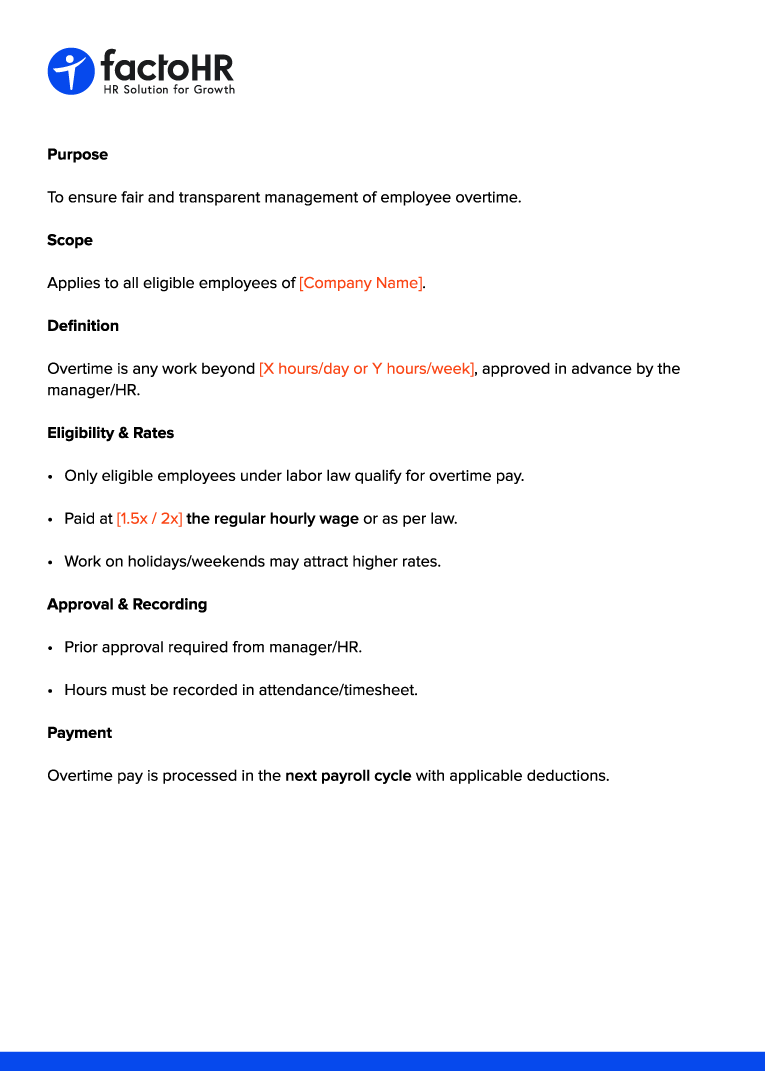Free Overtime Policy Template for Employees in India
Get Company Overtime Policy In PDF Format
Table of Contents
An overtime policy or OT policy is a formal framework that defines how a company manages and compensates work performed beyond standard working hours. It sets clear expectations for both employees and management, ensuring fair pay, legal compliance, and transparency.
The Overtime Policy Should Include:
- Employees receive fair pay for OT hours.
- Additional hours count as overtime only with prior approval from the manager.
- Failure to comply with mandatory OT assigned by the company without providing a valid prior notice of non-compliance may result in serious consequences.
- The company sets an overtime cap or limit.
- Employees must record overtime hours accurately so the company can calculate pay correctly based on those records.

Company Overtime Policy Template

The following company overtime policy template outlines the procedures for compensating employees who work beyond their standard schedule. This template serves as a reference for setting up your own policy.
Policy Brief and Purpose
This employee overtime pay policy clearly states guidelines on how the organization manages and compensates overtime work.
Objectives of this Policy
- Provide accurate and timely compensation to employees for overtime.
- Prevent misuse of overtime that could result in reduced productivity, workplace fatigue, health and safety risks, or operational inefficiencies.
- Meet all labor laws and regulations concerning OT work and compensation.
This policy is designed to aid, not contradict, existing labor legislation. The organization will follow relevant legislation when managing OT hours.
Scope
This policy applies to all eligible employees of the organization, unless specifically exempted under applicable overtime regulations.
Policy Elements
The organization considers standard working hours to be those specified in each employee’s contract of employment, subject to the legal limits on daily or weekly working time.
Overtime refers to any hours worked beyond the employee’s standard schedule that qualify for compensation under applicable laws and organizational rules.
General Rules
- Employees will be classified as exempt or non-exempt according to the overtime legislation.
- Non-exempt employees, who work for more hours than their standard hours, are eligible for OT pay.
- An employee is eligible for overtime pay irrespective of the place of work, provided the duties performed are recognized and accepted by the organization.
Excessive Overtime
Overtime may be required to meet urgent deadlines, handle emergencies, or manage peak workloads. The organization recognizes that excessive overtime harms health and performance. To prevent this, the organization will:
- Keep accurate records of overtime hours.
- Limit overtime to urgent or essential tasks.
- Provide resources and planning to reduce repeated OT.
- Track work quality, health, and performance to identify risks from long hours.
- Set a cap of [2 hours per day / 8 hours per week].
- Pay applies beyond this limit as per law, but employees must follow the cap.
The organization will not:
- Require employees to work beyond the statutory maximum daily or weekly hours permitted by law.
- Apply unfair or discriminatory practices in assigning overtime work or determining compensation.
Shift-Based System
The following rules apply to employees working in shifts in compliance with the labor standards:
- Night shift employees may not work more than 2 hours of overtime, except in emergencies.
- The Employees on 12-hour shifts may not exceed 2 hours of overtime.
- Employees on 8–10-hour shifts may not exceed 4 hours of overtime.
- The Employees on shifts longer than 8 hours may not work double shifts.
Exempt Employees
Specific categories of employees are exempt from overtime pay under the law. For these employees:
- The organization may choose to provide overtime pay at its discretion.
- Rules on excessive overtime, health, and safety will still be applied.
Abuse of Overtime
To preserve fairness and prevent misuse of the system, the organization expects:
- Managers must not assign or encourage excessive or unnecessary overtime.
- Employees must not work overtime for additional pay, especially if it lowers work quality.
The organization will:
- Pay all eligible overtime at the correct rate within the payroll cycle.
- Keep accurate and reliable timekeeping and attendance records.
Procedure for OT Approval and Compensation
To ensure compliance with record-keeping obligations and timely payment, the following procedure will be followed:
1. Overtime Request and Approval
- Employees must obtain approval from the manager before overtime, except in emergencies.
- The manager and employee must agree on the need and duration.
2. Classification and Communication
- Managers must confirm employee classification as exempt or non-exempt.
- Employees must know their eligibility for overtime pay.
3. Record-Keeping
- Employees must log overtime hours in the timekeeping system.
- The organization will audit records regularly.
4. Compensation
- HR or Finance will calculate overtime pay based on the applicable laws and company pay scales.
- Employees will receive OT pay in the next payroll cycle.
Get Company Overtime Policy In Word Format

What is Employee Overtime?
When an employee works beyond the regular schedule, it is referred to as employee overtime.
What is an Example of an OT Policy?
An OT policy clearly defines how an organization regulates, approves, and compensates additional hours. The policy also covers eligibility, approval procedures, compensation rules, and limits on excessive overtime.
Why is an Overtime Policy Important?
There are multi-fold benefits of a well-drafted overtime policy. It helps organizations to meet legal compliance and offer fair compensation to employees. A strong policy also empowers HRs to prevent misuse of overtime hours and save costs in the long run.
Who are Exempt Employees in the Context of Overtime?
There could be a certain group of employees in the organization who are not entitled to overtime pay under labor laws. It could be due to their job roles or salary structure. For them, the organization may choose to provide overtime compensation at its discretion.
How Many Hours are You Legally Allowed to Work in a Day in India?
Under the Factories Act, 1948, an organization cannot engage employees for more than 9 hours a day or 48 hours a week with the standard wage. Any work rendered by the employee beyond these limits should be compensated as overtime.
What are the Overtime Rules in India?
Under the Indian labor law, the maximum working hours for employees can not be more than 9 hours per day, 48 hours per week. Should it come to an overtime situation, the maximum cap is 50 hours per quarter or 125 hours per year. As per Section 59 of the Factories Act, organizations are legally responsible for maintaining accurate overtime records and compensating those hours at twice the ordinary wage rate.
How is Overtime Calculated in India?
Earn more for extra effort—overtime is 2× pay. Example: ₹100/hour for 5 hours = ₹1,000. Run the Overtime Check Calculator for a quick estimate.
Disclaimer
This overtime policy template gives general guidelines only. Use it as a reference, not as a legal document. It may not cover all local, state, or federal laws. The author and factoHR accept no legal responsibility for how this policy is used.
Transform your HR operations with factoHR today
Choose a perfect plan satisfying your business demands and let factoHR handle all your HR’s tasks efficiently.

© 2026 Copyright factoHR


